Will West Bank mass evictions trigger Israeli-Palestinian clashes?
Palestinians in Masafer Yatta – or Firing Zone 918 to the Israelis – have lost a decade-long legal battle

Israel has begun demolishing buildings and evicting Palestinians in a contested area of the southern West Bank after a court ruling earlier this month approved the development of a military training zone.
The court decision follows “decades of demolition, rebuilding and a more than 20-year legal battle”, The Washington Post said, and will trigger what activists have described as “the biggest mass expulsion” of Palestinians in the West Bank since the 1967 war.
The demolitions have also “sparked expressions of concern” from the White House, the paper added. Joe Biden is due to visit Israel next month against a backdrop of “mounting instability” in Israel’s coalition government and the approval of “4,200 new housing units in Israeli settlements in the West Bank”.
Subscribe to The Week
Escape your echo chamber. Get the facts behind the news, plus analysis from multiple perspectives.

Sign up for The Week's Free Newsletters
From our morning news briefing to a weekly Good News Newsletter, get the best of The Week delivered directly to your inbox.
From our morning news briefing to a weekly Good News Newsletter, get the best of The Week delivered directly to your inbox.
In the firing zone
The area in question is a maze of “bone-shattering unpaved roads” that “crisscross” a poverty-stricken, hilly semi-desert”, The Guardian reported, “part of the 60% of the West Bank that is under full Israeli control”. Palestinians call it Masafer Yatta, “a collection of villages with a population of about 1,000”.
But to the Israeli state it is “Firing Zone 918, a military training area in which civilians are prohibited”, the paper added. And the fight over whether the land should be handed over to the military is “one of the fiercest battles of the Israeli occupation”.
The “tug of war for these dry rolling hills” began in the 1980s, The Washington Post said, when Israeli officials “laid claim to several areas of the West Bank for the stated reason of creating military training grounds”.
The court that decided in favour of the demolitions “was unswayed by historical documents presented by advocates for the Palestinians”, the paper added. Activists had claimed to have evidence that the government’s plan to establish a firing range four decades ago “was meant to prevent Palestinians from claiming the land”.
Sign up for Today's Best Articles in your inbox
A free daily email with the biggest news stories of the day – and the best features from TheWeek.com
The Israel Defense Forces (IDF) responded to the ruling by saying the “Supreme Court fully accepted the State Of Israel’s position” and that it “ruled that the petitioners were not permanent residents of the area”. The country’s highest court “also noted that the petitioners rejected any attempted compromise offered to them”, it added.
But Hamdan Mohammed al-Huraini, a local activist, told The Guardian: “It’s not really about destroying the houses. It’s about destroying the life.”
International condemnation
As well as the demonstrations by residents of Masafer Yatta and other disputed territories, the Israeli government has been criticised by a host of foreign governments.
Fifteen European countries last week urged Israel to stop plans for more illegal settlements in the West Bank, describing the plans as a “clear violation of international law” that “hinder fair, lasting and global peace between Israelis and Palestinians”.
“We are deeply concerned by the decision of the Israeli Higher Planning Council to advance plans for the construction of more than 4,000 housing units in the West Bank,” said spokespersons for the foreign ministries of France, Belgium, Denmark, Finland, Germany, Greece, Ireland, Italy, Luxembourg, Malta, the Netherlands, Norway, Poland, Spain and Sweden. “We urge the Israeli authorities to reverse this decision.”
The decision will “directly threaten the viability of a future Palestinian state”, they added, as well as creating “an additional obstacle to the two-state solution”.
The UN has also attacked the move, suggesting that the forced evictions could constitute a war crime against the Palestinian people.
“By upholding this policy to drive Palestinians out of Masafer Yatta, the Israeli judicial system has given carte blanche to the Israeli government to perpetuate the practice of systematic oppression against Palestinians,” three UN special rapporteurs said in a statement.
They continued that it was “all the more disconcerting” that the decision had been made to make way for a military training base, adding: “How can this be given priority over the rights of the Palestinian residents?
“Israel has shown no ‘imperative military necessity’ to vacate the area. The displacement of the Masafer Yatta communities may thus amount to a war crime.”
Violent response?
The threat of a mass eviction, including “some 500 children”, has given rise to fears of further violent clashes between the IDF and Palestinians, Al Jazeera reported.
In May last year, the government in Jerusalem was forced to declare a state of emergency in a number of cities after cars were set alight by Israeli Arabs, and Hamas, the Palestinian militant group that governs the Gaza Strip, fired more than 1,000 rockets towards central and southern Israel.
Triggered by forced evictions of Arabs in a disputed neighbourhood of Jerusalem and aggressive Israeli policing around the al-Aqsa mosque, the events quickly began to resemble previous uprisings by Palestinians – raising fears of a third bloody intifada.
Whether there will be a violent response to the evictions in Masafer Yatta remains to be seen. However, the extensive “military activity” that already takes place in the area may dissuade any demonstrations, The Guardian said.
Nadav Weiman, the deputy director of Breaking the Silence, an NGO that collects testimonies from former IDF soldiers, said that even before the evictions, his job in Masafer Yatta had been “to make people’s lives miserable”, adding: “That was the point.”
The speed of the demolitions may also stop any protests having time to ferment.
Many of the “simple houses of block and metal roofing” have already disappeared in a spate of destruction; two were flattened by a bulldozer in “less than two hours”, The Washington Post said.
Soldiers “instructed the men of the family to stay well away from the house as the women raced to grab clothes and bedding”, the paper added. But “many of their belongings were still inside when the soldiers told them to stand back”.
Create an account with the same email registered to your subscription to unlock access.
-
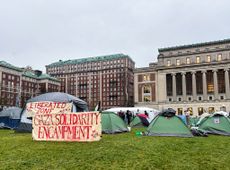 'Republicans want to silence Israel's opponents'
'Republicans want to silence Israel's opponents'Instant Opinion Opinion, comment and editorials of the day
By Harold Maass, The Week US Published
-
 Poland, Germany nab alleged anti-Ukraine spies
Poland, Germany nab alleged anti-Ukraine spiesSpeed Read A man was arrested over a supposed Russian plot to kill Ukrainian President Zelenskyy
By Peter Weber, The Week US Published
-
 Today's political cartoons - April 19, 2024
Today's political cartoons - April 19, 2024Cartoons Friday's cartoons - priority delivery, USPS on fire, and more
By The Week US Published
-
 How would we know if World War Three had started?
How would we know if World War Three had started?Today's Big Question With conflicts in Ukraine, Middle East, Africa and Asia-Pacific, the 'spark' that could ignite all-out war 'already exists'
By Harriet Marsden, The Week UK Published
-
 Will Iran attack hinder support for Ukraine?
Will Iran attack hinder support for Ukraine?Today's Big Question Pro-Kyiv allies cry 'hypocrisy' and 'double standards' even as the US readies new support package
By Elliott Goat, The Week UK Published
-
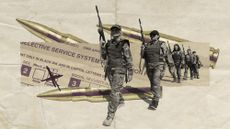 The issue of women and conscription
The issue of women and conscriptionUnder the radar Ukraine military adviser hints at widening draft to women, as other countries weigh defence options amid global insecurity
By Harriet Marsden, The Week UK Published
-
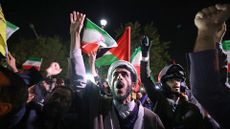 Will Iran's attack on Israel backfire?
Will Iran's attack on Israel backfire?Today's Big Question The unprecedented targeting of Israel could be a 'godsend' for Netanyahu as the limits of Tehran's military power are exposed
By Elliott Goat, The Week UK Published
-
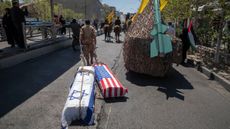 Will Iran risk all-out war with Israel?
Will Iran risk all-out war with Israel?Today's Big Question Tehran has not wanted to be directly involved in the Middle East conflict so far. But that could be about to change
By Chas Newkey-Burden, The Week UK Published
-
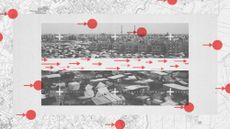 'Humanitarian islands': how will Israel's plan for Rafah civilians work?
'Humanitarian islands': how will Israel's plan for Rafah civilians work?Today's Big Question Designated zones in central Gaza to provide temporary housing, food and water for more than a million displaced Palestinians
By The Week UK Published
-
 Ukraine's unconventional approach to reconstruction
Ukraine's unconventional approach to reconstructionUnder the radar Digitally savvy nation uses popular app to file compensation claims, access funds and rebuild destroyed homes
By Harriet Marsden, The Week UK Published
-
 Will Ukraine's leadership reset work?
Will Ukraine's leadership reset work?Today's Big Question Zelenskyy hints at ousting of popular military chief, but risks backlash amid dwindling munitions, delayed funding and Russian bombardment
By Harriet Marsden, The Week UK Published